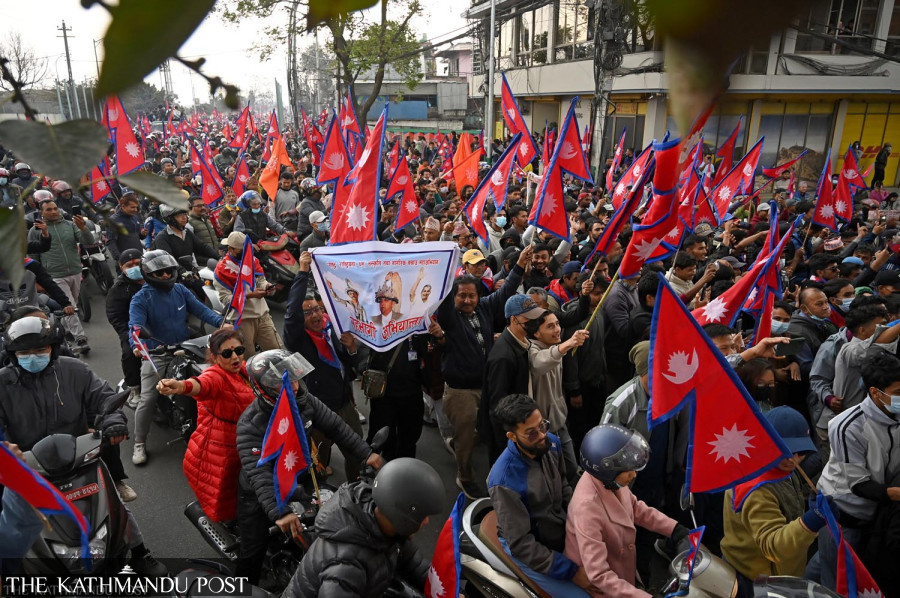Politics
Rift widens in royalist ranks
Amid falling turnout, pro-monarchy parties plan to decentralise protest.
Purushottam Poudel
Royalist groups opposing the current political system held a meeting on Wednesday to discuss changes on the nature of their ongoing movement for the reinstatement of the Hindu kingdom. But the meeting descended into chaos when the attendees began questioning the leadership.
Despite the disorder, a press statement issued after the meeting stated that six decisions were made. The key decision is to decentralise the protest by dispersing it across the country instead of keeping it concentrated in Kathmandu.
Leaders acknowledged that the protest, which was launched on May 29 with the aim of making it decisive, had seen a significant decline in participants by Tuesday compared to the first day.
The press statement announced that protests would continue in various municipalities within the Kathmandu Valley. It includes plans to organise protest assemblies, sit-ins, and mass demonstrations in major cities outside the Valley, and to mobilise youth groups across districts, among others.
Interestingly, Rajendra Lingden, the chair of the Rastriya Prajatantra Party, the largest political party within the royalist faction, was absent from the meeting. The royalist groups operating under the banner of the Joint People's Movement Committee since May 29, had called the meeting a week after the movement began to discuss restructuring their strategy.
The Joint People’s Movement Committee was formed on March 18 under the leadership of Panchayat-era leader Nabaraj Subedi with the aim to restore Hindu state and monarchy. When the committee named RPP chair Lingden as a member of its advisory committee, he rejected the position, saying his name was included without his consent.
Nevertheless, RPP lent its support at the last moment to a protest held at Tinkune on March 28, which was also coordinated by the committee.
The protest of March 28 turned violent, resulting in the deaths of two individuals, including a journalist, and causing damage to both public and private property.
Following the violence, former King Gyanendra Shah held multiple meetings with leaders from the RPP and other outfits in an effort to unite the fragmented monarchist camp. Although that effort initially showed some promise, the unity now appears to be unravelling.
Lingden’s absence from Wednesday’s meeting has renewed concerns about deepening divisions within the movement.
Although similar concerns had been raised before, the central committee meeting of the RPP on June 2 had issued a press statement reaffirming the party’s commitment to the movement.
Participants at Wednesday’s meeting questioned Lingden’s absence. Subedi defended him by saying that Lingden was attending a parliamentary session. RPP spokesperson Mohan Shrestha echoed the explanation.
Despite these claims, rift is visible within the movement.
Tensions became particularly evident after Sunday’s protest, during which Rastriya Prajatantra Party Nepal chairman Kamal Thapa and several others were arrested by the police. In protest, the Joint People's Movement Committee called for a nationwide strike for Monday.
However, the RPP opposed the strike. Some RPP leaders accused the committee of announcing the strike without consulting them, claiming it was an attempt to disrupt the momentum of the movement.
“Among the more than 40 groups within the royalist camp, RPP is the largest one. But, the decision to call a nationwide strike without the party’s consent caused some friction within the movement,” said an RPP leader on the condition of anonymity. “That said, the issues currently being observed can still be resolved through dialogue.”
However, a leader from the Joint People’s Movement Committee claimed that the press statement had been issued with the RPP chairman’s consent. He also stated that Wednesday’s meeting was initially intended to include only one representative from each of the 44 royalist groups, but the participation of more individuals than expected led to logistical challenges.
“There was some commotion due to the larger-than-expected turnout,” the leader, who refused to be identified, said, adding, “but that should not be interpreted as a split within the movement.”
Previously, former King Gyanendra had stepped in to bring the royalist factions together. When the Post asked whether another royal intervention might be needed to restore unity, another RPP leader claimed that the current rift has, in fact, caused by Nirmal Niwas (the former king’s residence) itself.
The RPP leader also accused Nirmal Niwas of trying to interfere in the internal affairs of his party.
According to him, things started to unravel on March 18 when senior RPP leaders were appointed to key positions in the Joint People's Movement Committee without the party’s knowledge.
Rabindra Mishra, the party’s senior vice-chair, was named as the committee’s member secretary, and General Secretary Dhawal Shamsher Rana was appointed as coordinator of the Movement Mobilisation Committee—decisions allegedly made without consulting the RPP leadership.
Following the violent protest on March 28, police took both Mishra and Rana, who is also a lawmaker, into custody. However, while Rana, who has oesophagus cancer, was released on April 21 for medical treatment, Mishra was released only on May 16. Since his release, Rana has participated in royalist protests organised by the RPP-Nepal on April 28, but has not attended parliamentary sessions.
“Due to my health condition, I have not been able to attend either the protests or the parliamentary sessions,” Rana told the Post.
Despite Rana’s claims, both party and police sources suggest that he has been kept away from events to avoid rearrest. After attending RPP-Nepal’s event on April 28, police reportedly warned him against joining any further protests.
As for Mishra, police have confiscated his mobile phone for forensic examination. According to Sharad Raj Pathak, an RPP general secretary close to Mishra, he is currently at home in Bhaisepati.
“If the police summon him, he will cooperate. But for now, he is at home,” Pathak said.




 9.7°C Kathmandu
9.7°C Kathmandu














